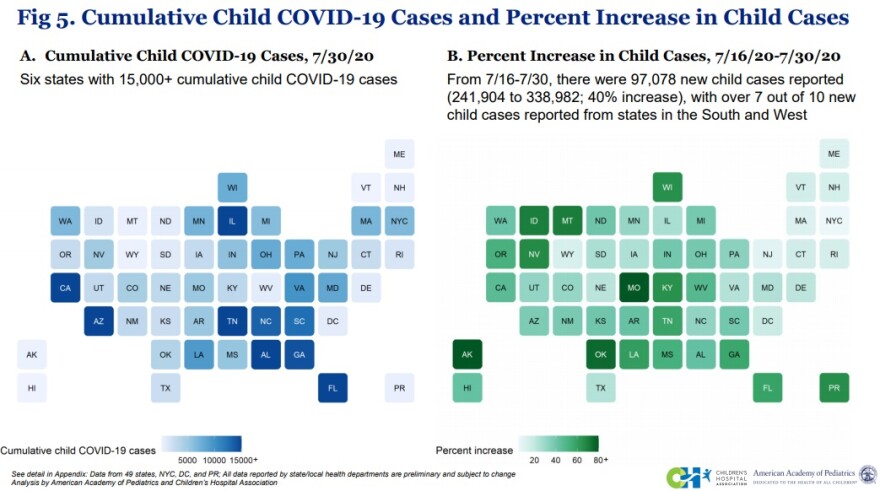A new report says the number of children who tested positive for the coronavirus in the United States increased by 40% in July.
The review of state-level data by the American Academy of Pediatrics and Children's Hospital Association shows the increase was largely fueled by states in the South and West, including Florida, Missouri, Oklahoma, Georgia, Montana and Alaska.
Nearly 25,000 children in Florida have tested positive for coronavirus - representing 5.5% of total cases in the state.
It comes as schools prepare to reopen for in-person classes. Gov. Ron DeSantis has pushed for the reopening, saying children face few health risks from COVID-19.
RELATED: DeSantis Repeats Stance On School Reopenings During Riverview Education Roundtable
Dr. Mobeen Rathore, a member of the American Academy of Pediatrics' Committee on Infectious Diseases, and Associate Chair of Department of Pediatrics at the University of Florida, says that number is likely even higher in actuality.
"Because a lot of children are asymptomatic or mildly symptomatic, the actually infected kids are probably much more in Florida than it has been reported,” Rathore said.
RELATED: At Least 97,000 Children Tested Positive For Coronavirus In Last 2 Weeks Of July
While child infection rates have increased, the data show that most children do not get critically ill with the disease. In Florida, the current hospitalization rate for children remains low, just over half a percent.
But Rathore said that doesn’t stop children from passing along the virus at school and home.
“Unfortunately, that's going to also impact the teachers and the staff. You will also see school closings as you have already seen in Indiana and Mississippi and Georgia. I think it's not a matter of if, it's a matter of when."
Children will also take the virus home to family members, Rathore said, which will disproportionately impact latinx and black families living in multi-generational homes.
Data from the report had some limitations. Format, content, and metrics of reported COVID-19 data differed substantially by state, as did the definition of “child.” age ranges reported for children varied by state (0-14, 0-17, 0-18, 0-19, 0-20, and 0-24 years; Texas reported age distribution for only 8% of all cases and is excluded from some figures; Alabama reported children as ages 0-24 and is excluded from some figures.





